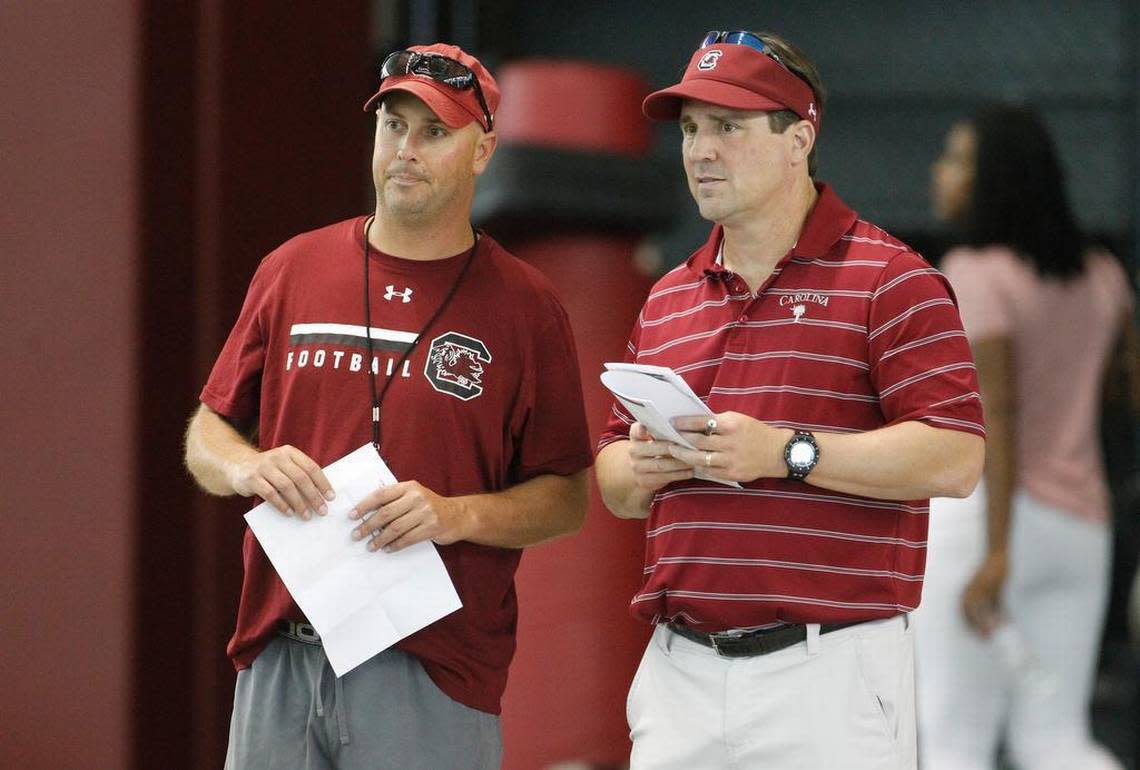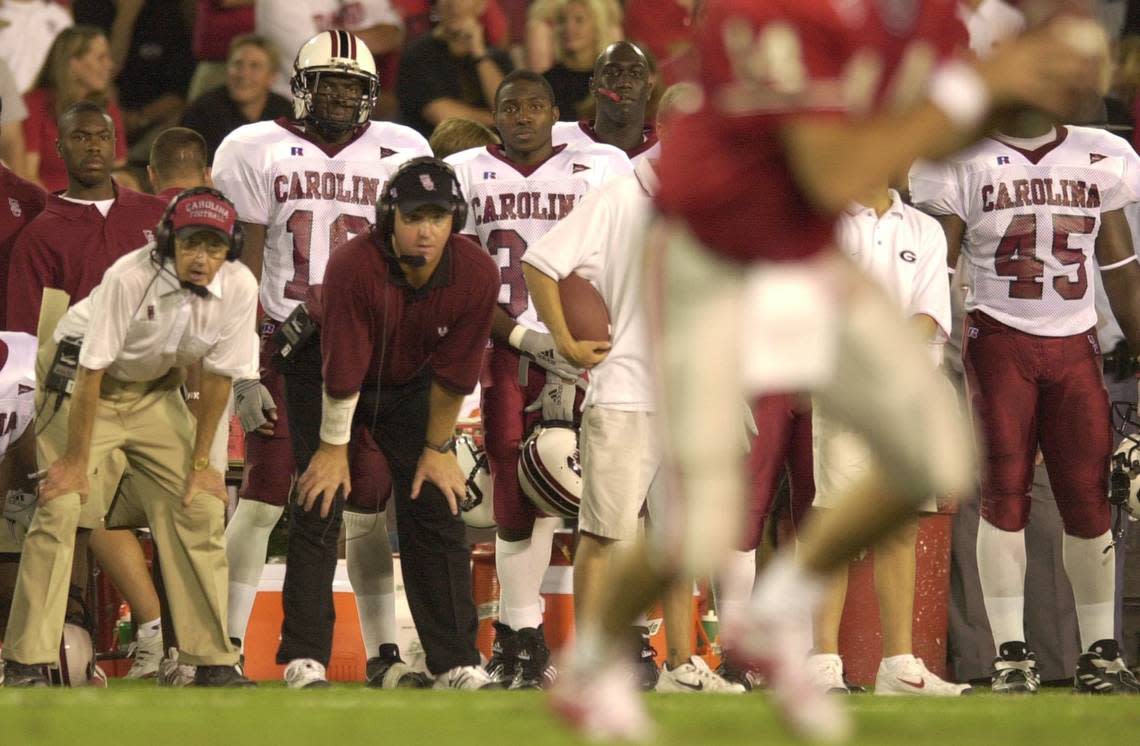A look at ups and downs of South Carolina’s offensive coordinators the last 40 years
South Carolina is back in the market for an offensive coordinator, a spot it seems to know very well.
The Gamecocks have had issues snagging a good, consistent coordinator for more than half a decade. The past four all had their struggles.
So what exactly happened with this key role that has been seemingly in flux for some time?
Marcus Satterfield, 2021-22
The former Temple OC and Tennessee Tech head coach arrived with a recommendation from former Panthers coach Matt Rhule and a long history with Shane Beamer. His first offense struggled early, drew criticism and was never consistent enough to dig out of that hole. The 2022 group was up and down, turned in two horrendous days against Missouri and Florida before stunning No. 5 Tennessee with 63 points and topping rival Clemson. Then, Satterfield left to take the coordinator role under Rhule at Nebraska.
Mike Bobo, 2020
A veteran and former teammate of then-coach Will Muschamp, Bobo arrived as the last gasp of his friend’s tenure. Bobo installed a modestly successful run game, but inheriting a threadbare receiving room, a poor set of pass-blocking tackles and dealing with a pandemic-disrupted offseason, the passing game never came into focus. Despite some solid play-calling, handpicked transfer QB Collin Hill didn’t have many moments, and the inconsistent attack couldn’t cover for a disastrous defense. Bobo was almost retained by Shane Beamer, but he took a chance to go to Auburn, which fired him after Bryan Harsin’s tumultuous first year.
Bryan McClendon, 2018-19
McClendon’s tenure was boom and bust. He installed an up-tempo RPO offense that started slow but closed the regular season on a heater, powered by a trio of NFL receivers in Deebo Samuel, Bryan Edwards and Shi Smith, plus veteran quarterback Jake Bentley. A Deebo-less bowl shutout set the sage for a trying second year. A bad opening performance ended with Bentley getting hurt and freshman Ryan Hilinski being thrown in. Between more injuries, a run game that never came around and a late slide, McClendon was demoted at season’s end, and eventually took a pay cut to leave town.

Kurt Roper, 2016-17
A longtime David Cutcliffe lieutenant, Roper was not able to save Muschamp’s tenure in Florida but still ended up back with him in Columbia. Roper did well in getting a young Jake Bentley into the mix and functioning enough to make a bowl as a true freshman, but his offenses always felt like less than the sum of their parts. His two years included three tailbacks who had at least a cup of coffee in the NFL, one year of a future NFL star (Samuel), a first-round tight end (Hayden Hurst), plus good next-level players in Bryan Edwards and Shi Smith. All of those pieces yielded a pair of attacks that could not surpass 92nd nationally in points per drive.
Steve Spurrier, 2005-15
... with cameos from Shawn Elliott, Steve Spurrier Jr. and a little G.A. Mangus
It was hard to tell exactly how much impact any of the assistants had on play-calling at a given time. Spurrier — possibly the greatest pure play caller in college football history — didn’t even have a listed offensive coordinator from 2005-2011. Elliott brought some of the zone running approach he’d learned at Appalachian State. Mangus was not considered the coordinator until Spurrier resigned during the 2015 season and Elliott was made interim, but he always seemed to have some voice. Through much of the Spurrier run, there were moments when it was suggested others were making the calls on given weeks. The final product was up and down across 11 seasons (some very good, some pretty bad), and plenty of times when calls were questioned. Ultimately, Spurrier’s pedigree gave him a lot of equity with fans.
Lou Holtz, 2004
Showing that tumult here is not all that new, Hall of Famer Lou Holtz called the plays his final season, after demoting his son Skip. The elder statesman of the sport tried to revert back to his preferred option style. It allowed Demetris Summers to put up some OK numbers and Troy Williamson flourished, but ultimately the offense was only 87th in scoring, and Holtz was pushed out after the season.

Skip Holtz, 1999-2003
The young Holtz’ tenure was more successful than not. After a stint running the UConn program, he brought some more spread-out elements to his father’s ground-heavy attack. It didn’t look like a modern spread, and Derek Watson and Andrew Pinnock became prolific rushers out of the I-formation. Still, Phil Petty got to sling it out of the shotgun some to the likes of Jermale Kelly, Brian Scott and Ryan Brewer. Two nice seasons in 2000 and 2001 gave way to a couple rough seasons with a more mobile quarterback, and the elder Holtz made his change.
Chuck Reedy, 1998
The last gasp of the Brad Scott era was not a pretty one. Reedy was supposed to bring in a ground-and-pound approach that reflected the older Clemson offenses he’d worked on. The Gamecocks had been trying to shore up and support a defense that had been a problem early in the Scott era. Ultimately, nothing worked that year. The Gamecocks were 92nd in scoring, despite having such talent as Anthony Wright, Troy Hambrick, Zola Davis and Jermale Kelly. They won one game and fired the staff at year’s end.
John Eason, 1995-1998
Eason, working under Scott, helped build one of the more innovative and impressive offenses in the school’s history. The 1995 group rode Steve Taneyhill, Duce Staley, Stanley Pritchett, Zola Davis, Monty Means and others to 36.5 points per game in a shootout-heavy campaign. The next year, they put more on Staley’s shoulders (along with Anthony Wright at QB and Marcus Robinson at receiver). By Eason’s last year, the offense had slipped to 63rd nationally in scoring.
Rickey Bustle, 1994
Brad Scott’s first offensive coordinator, Bustle ran an attack that included a productive Taneyhill (second in the SEC in passing yards), a productive backfield of Brandon Bennett and Stanley Pritchett, and Toby Cates as the top receiver. The group ended up middle of the pack in the SEC in scoring. Bustle left Columbia after one season to work for Frank Beamer at Virginia Tech. He ultimately coached the Michael Vick offense that played for a national title and spent nine years as head coach at Louisiana–Lafayette.
Art Wilkins, 1989-1993
South Carolina’s only offensive coordinator under Sparky Woods, Wilkins coached a set of middling offenses that slipped once the program joined the SEC. His last two attacks ranked 89th or worse in scoring. His tenure included the end of Todd Ellis’ career, the Bobby Fuller era and bringing in Steve Taneyhill. He also coached most of Brandon Bennett’s decorated career, some productive years from Harold Green and Mike Dingle, as well as all of Robert Brooks’ career. He went on to coach for several decades at a Division II school in the Northeast.
Al Groh, 1988
A longtime defensive coach, Groh was handed a strong offense with the likes of Todd Ellis, Robert Brooks, Harold Green and Mike Dingle (but did lose its top four receivers). The scoring output slipped from top-20 nationally to 75th, and interceptions were a problem (21, for an offense that scored 20 touchdowns in 12 games). The Gamecocks went 8-4 despite outscoring opponents by only a point per game, and Groh was fired with the rest of the staff after Joe Morrison’s death.
Frank Sadler, 1983-1987
Sadler was a longtime Joe Morrison assistant who installed a veer attack that helped power the 1984 “Black Magic” team. A few years later, he oversaw a switch to a pass-heavy, run-and-shoot offense with Todd Ellis, Sterling Sharpe and Ryan Bethea that produced the 18th-best scoring offense in the country in 1987. Sadler was fired after that season, as Morrison wanted to commit to the more pass-happy attack.
